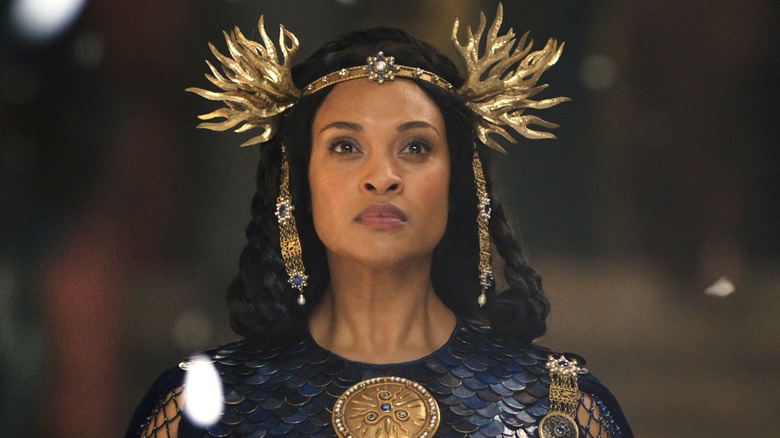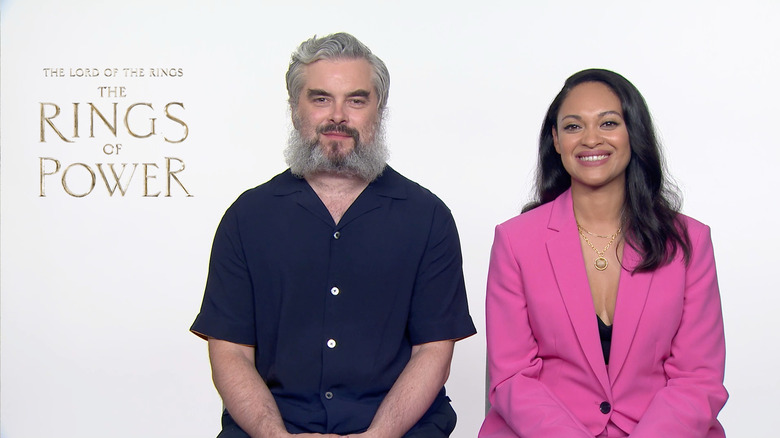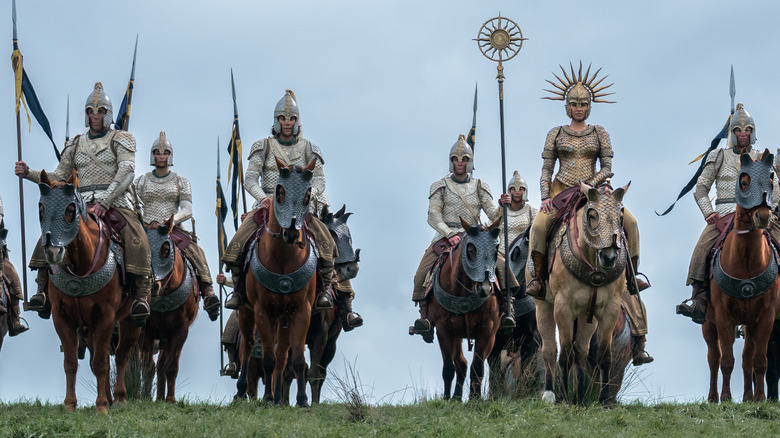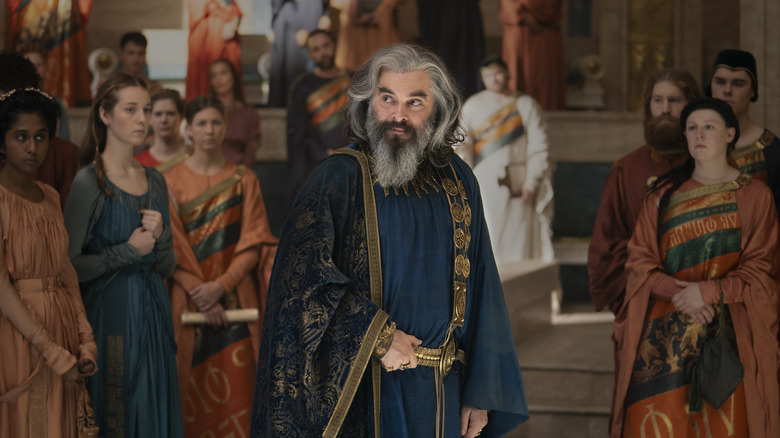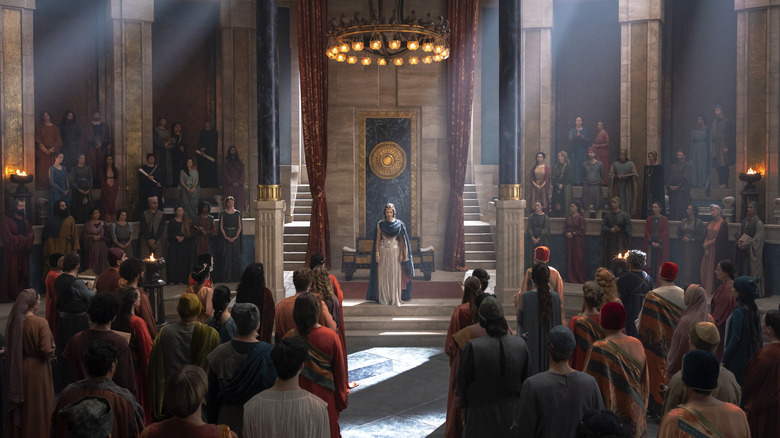Cynthia Addai-Robinson And Trystan Gravelle Dish On Númenorian Politics And Complex Characters - Exclusive Interview
Prime Video's "The Rings of Power" series is set thousands of years before "The Lord of the Rings" and will spend time exploring the vast geography of Middle-earth. From the frozen Forodwaith in the north to the scorching heats of the Southlands, the series will paint on a much larger canvas than that of Peter Jackson and company two decades ago.
Another key area that will also be included is the island nation of Númenor. This is a star-shaped chunk of land located off the southwestern coast of Middle-earth. The Atlantian civilization exists only during the Second Age, and it houses one of the most important nations of Men in all of Middle-earth history. Aragorn claims the kingship of Gondor thanks to his connection to the kings of Númenor. Isildur (the fella who cuts the One Ring from Sauron's hand) is born on the island, as is his father, Elendil (both of whom will be in "The Rings of Power").
While many known "The Lord of the Rings" characters connect back to Númenor, there are also several essential new faces that we'll meet onscreen for the first time when "The Rings of Power" launches. Two of these are the Queen Regent Míriel and Pharazôn, played by Cynthia Addai-Robinson and Trystan Gravelle, respectively. We had a chance to sit down with these two regal personalities and picked their brains on what to expect when we meet their complex and politically charged characters in the 1st season of the show.
Cynthia and Trystan may play royalty, but they relate to Hobbits
A nice, light question to start off: What is each of your favorite original Tolkien characters from the text?
Trystan Gravelle: Original Tolkien character from the text. That's a really good one.
Cynthia Addai-Robinson: That's hard because there are so many, it's like, "Ah!" I'm going to go with Frodo. There's something about that childlike innocence that, as you get older, there's always a part of you that still has the child version of yourself, the one that's wide-eyed and innocent but also eventually has to grow up and go forth. I have a soft spot for when I take in that type of story, somebody that's coming into their own, stepping into their own adulthood for the first time, which is scary but necessary and inevitable, and the people who also populate that part of your life along the way. That's my soft spot, softy choice.
Gravelle: I'm going to go with Bilbo because I'd like to think of myself as an Elf, but deep down, I know that's not the case. Being Welsh — [in] Welsh culture, there's a lot of rugby, beer, and camaraderie. On a good day, you could possibly pass for a Dwarf, and that's on a good day. But usually, with the scale of everything around, you feel so small in this world and helpless sometimes, but you go along for the journey. You run the gauntlet and have all these emotions. So you are a Hobbit, essentially. I think Bilbo more than Frodo for myself because he doesn't seem to have such a bad time of it [as] Frodo does. He's so tortured and so whipped from the start line to the finish line. Bilbo gets to enjoy it a little.
Addai-Robinson: Fair.
Season 1 will introduce Númenor, its Queen Regent, and civil turmoil
As far as your characters in "[The] Rings of Power," the first question I have is, how much of Númenor, as far as you're allowed to say, are we going to get to see in the 1st season?
Addai-Robinson: The 1st season is really about introducing it because there are a lot of viewers who are not going to be familiar with Númenor, and for those who are familiar with Númenor, this is the first time they're getting to see it depicted on screen. So initially, it's about introducing it, and the audience is going to have that introduction. There are also going to be characters that ... It's sort of through the eyes of characters. You will be in awe of this place that you've heard about and now you get to see in all its glory.
Cynthia, what is your [character's] official role in that governmental apparatus when the show starts? Do we officially know the character?
Addai-Robinson: Officially, I am playing Queen Míriel. Now, at this point in time, when we're meeting her in the story, she is the Queen Regent. As Queen Regent, she is not fully yet queen, but she is essentially [the] woman in charge. When we are first introduced to Númenor, it is at a time of relative peace and stability, a civilization at the height of its wealth, its power. And she intends to keep it that way. But as we know, throughout history and even [in] real life currently, it's never simple. It's never so easy. You have a lot of people who believe that the way forward should be based [on] a different idea of what that is. So she is navigating her people through a segment of society that believes in maintaining and holding on to tradition and the Elven ways. And there are also people who believe in moving forward and leaving that behind and modernizing, innovating, progressing. That's what we're seeing as we first are introduced to Númenor.
Pharazôn will be a complex character
Trystan, Pharazôn is an intense character. He's a mortal man who literally captures Sauron at one point, but he is also terrified of death, which [showrunners] Patrick [McKay] and J.D. [Payne] have also pointed out as a major theme here. How has it been balancing a character between ultimate power almost and that fear of death?
Gravelle: Pharazôn is a very interesting character for me to play, because [with] a lot of characters, you see the character, and the longer something goes on, the more nuanced it becomes. It fans out, and you see different sides to the character. I think what you're going to see with Pharazôn ... you will see that character, that multifaceted character. But what happens is, before any altruism, the more altruistic you get with things, there's a narrowing down of one thing to learn, so he will become more intense. All of a sudden, you will be going down some rabbit hole, or some barrel, I guess, with what you're trying to do for the good of your people.
Addai-Robinson: What I think is really great is it would be a trap when you know where a character ultimately ends up. You need to start somewhere to be able to progress to that place.
Gravelle: Indeed.
Addai-Robinson: What I really love about your portrayal is that this has the feelings of a person before it becomes something much larger. You don't want to start as a cartoon villain.
Gravelle: Absolutely.
Addai-Robinson: This feels very grounded, and there's a lot of nuance. What I really love about your portrayal is that you have to start somewhere. His beginning — to know where the arc ultimately goes, it's going to be that much more powerful, because when it starts, you're just a man that has a belief. You believe what you're doing is the right thing, but it has to start contained, in a way.
Gravelle: Thank you.
On the challenge of capturing the essence of Númenor
The entire Númenorian story, it's equal parts tragic and epic at the same time. It's this Atlantian thing, and it's huge. It's a really important part in Tolkien's story. Do you think you guys are going to be able, over the five seasons, to capture that essence in the Númenorian storyline within all of these other storylines that are going on around it?
Addai-Robinson: Oh, yeah.
Gravelle: Oh, yes. I'm sure we will.
Addai-Robinson: J.D. [Payne] and Patrick [McKay] and the producers — the level of knowledge and intelligence and creativity. Again, you know where the story ultimately ends up, but this is going to be about how we get there. You're telling this story in a serialized way, so you have the room and you have the time. This isn't [a] two-hour movie. This is going to be eight episodes in the 1st season, just to lay the groundwork, just to set things out.
But even within the 1st season, characters start in one place, and then you set them at their end place for Season 1. What's great is that [in] the 1st season, they do a wonderful job of setting up and then placing people where they land. Even for us, we don't really know beyond Season 1 where these stories go. So as a fan, I'm excited to see where it goes, what the story becomes later on, and how long it will take to get there because we ourselves don't actually know that. There's still some mystery for us as well.
"The Lord of the Rings: The Rings of Power" premieres on September 2. Its 1st season will consist of eight one-hour episodes. These will explore the four corners of J.R.R. Tolkien's world during the harrowing days of Sauron's first rise to power during the Second Age of Middle-earth.
This interview has been edited for clarity.
